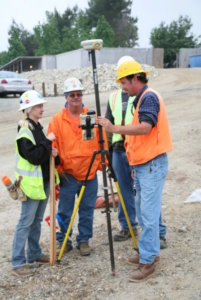Southern Nevada Operating Engineers JATC
What would I do as an Operating Engineer?
Operating Engineers are highly trained, skilled professionals who:
-
Operate heavy construction equipment on high-rise buildings, roads and freeways, residential developments, dams, waterways, airports, and underground tunnels; or
-
Do specialized work operating cranes, concrete pumpers, pile drivers, or drilling equipment; or
-
Perform inspections and testing during the construction phase on such things as reinforced concrete, soils, structural masonry, prestressed concrete, structural steel, and welding; or
-
Repair and maintain heavy duty construction equipment, working in shops or on job sites where equipment has broken down; or
-
Work in plants that produce sand, gravel, asphalt, and concrete; or
-
Work on or near the water with dredging equipment
What’s the downside to being an Operating Engineer?
Operating Engineers must be physically able to perform rigorous work and be willing to accept as a normal part of the job…
-
Dirty, sometimes dangerous, conditions
-
Uncomfortably hot or cold weather
-
Work underground, in high places, and in close quarters
-
Long drives to job sites in remote areas and irregular hours
-
Heavy lifting and rough riding equipment
Despite the downside, tens of thousands of Operating Engineers will attest that the rewards of this work far outweigh its discomforts.
What are the qualifications to enter the Apprenticeship Program?

Applicants must meet certain eligibility requirements prior to acceptance into the Apprenticeship Program. These requirements include:
-
Be physically able (with or without accommodations) to perform the work.
Physical requirements include adequate vision and hearing; the ability to bend and stoop; climb vertical ladders up to five feet in height; lift loads up to fifty pounds; pull/push levers with resistance up to five pounds; and the ability to sit and stand for long periods of time.
-
Be a high school graduate or equivalent, e.g. successfully completed General Educational Development (GED).
-
Be at least 18 years old when entering the program.
-
Note: An individual may submit an application prior to reaching the age of 18, but acceptance into the program will not occur until the age of 18 is obtained.
-
Be legal to work in the United States.
-
Have reliable transportation.
Travel to remote job and training sites, at various hours during the day and/or night, is required of all apprentices. Reliable transportation is essential. It is required that an applicant possess a valid Nevada Driver’s License prior to being accepted into the program.
-
Pass an entrance examination.
The entrance examination is designed to test basic verbal, math, and mechanical abilities that are essential for succeeding in the Apprenticeship Program.
-
Pass a Substance Abuse Test.
Prior to acceptance into the program, applicants must pass a Substance Abuse Test. This test will be provided by the Operating Engineers Training Trust.
Note: Any required documents that are printed in a language other than English MUST be accompanied by a notarized English translation and must be provided with the completed application.
Job Classifications
Applicants to the Apprenticeship Program are required to identify the particular job classification they are most interested in being assigned.
Applicants should understand some of the classifications are more numerous in the workplace than others, and hence, are more likely to require more apprentices than others. Accepted applicants are only brought into the Apprenticeship Program when a need arises in the workplace.
Applicants that select some classifications over others on their applications may find their entry into the program delayed due to lack of demand for that particular classification(s).

The Different Job Classifications Are:
Equipment Operator
This is the largest classification of operators in the workplace and provides the largest quantity of work for Operating Engineers. As the name implies, Equipment Operators run the heavy construction equipment on the jobsite. This includes cranes and earthmoving equipment such as dozers, scrapers, compactors, backhoes, motor graders, etc. This classification offers the most diversity in operating various types of equipment in many different applications and settings
Heavy Duty Repair Person
This classification refers to those Operating Engineers that maintain and repair heavy equipment. This can be a very demanding profession, frequently requiring work at night, and the need for the repair person to purchase personal tools as individual skills and experience grow in the trade. It is not uncommon for heavy duty repair persons to have thousands of dollars invested in their tools. It is recommended that applicants selecting this classification have some measure of mechanical ability. The demand for this classification varies, but is usually lower when compared to Equipment Operators.
Who are the Operating Engineers?
Operating Engineers are the people who operate, maintain, and repair heavy construction equipment. You will find Operating Engineers working on the freeways and other construction sites operating cranes and earthmoving equipment such as dozers, scrapers, compactors, backhoes, motor graders, etc. Operating Engineers also perform work as plant operators for rock plants, dredging equipment, and act as special inspectors verifying the quality of construction work. Operating Engineers are members of the International Union of Operating Engineers (IUOE), an AFL-CIO affiliated union that is comprised of independent Locals throughout the country. Local 12--whose territory includes Southern Nevada--is one of the largest and most influential locals in the IUOE.
What is the Southern Nevada Operating Engineers Journeyman & Apprentice Training Committee?
The Southern Nevada Operating Engineers Journeyman & Apprentice Training Committee is a non-profit entity created by Local 12 and its signatory contractors to provide training resources. Monies managed by the Committee are used to purchase training equipment, to hire instructors, and to provide a host of other educational resources that are used by both apprentices and journeypersons alike. The Apprenticeship Program is completely funded and managed by the Committee.
Are you accepting applications at this time?
Yes. Applications may be obtained on the third (3rd) Thursday of every month between the hours of 8:00 AM and 4:30 PM at the William C. Waggoner Training Center, 6350 Howdy Wells Avenue, Las Vegas, NV 89115.
Why are you not open all the time?
State law requires us to accept applications at least every two (2) years. Applicants that meet the eligibility requirements, which includes passing the written entrance examination, are placed on the Accepted Applicants List (a waiting list). We can only bring people into our program when contractors need additional operators. Usually, there will be more applicants on this waiting list than we can bring into our program in the two year period between openings for new applications. Some applicants remain on the waiting list for the entire two year period. After two years, we open the program again, test new applicants, and create a new Accepted Applicants List. Anyone still on the previous list will need to both reapply, and retest, to again become eligible for the program. Placement on the new Accepted Applicants List is totally dependent on one’s most recent examination score. No credit is given for having been on the previous list.
Can you mail me an application?
Yes. If you live outside of Clark County (Nevada) an application can be mailed to you. You may use the Contact for Support Form or call (702) 643-1212 to request an application to be mailed to you and provide your name and address.
Do I personally have to pick up the application, or can someone else pick up the application for me?
Anyone can pick up an application for you.
Do I need experience to apply?
No. The Apprenticeship Program includes training to bring you up to a minimum level of safety before you are placed on a job.
If I have related experience, will it help me?
In some cases it may help. For all classifications – other than Surveyors and General Machinist – prior work experience and education can add to the points you receive during the application process. As described in the Oral Interview section of the Apprenticeship Program information found on this website, these points are used to determine your eligibility for an oral interview.










